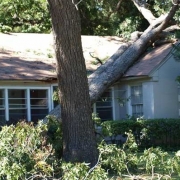Vigilance Urged In Toxic Mold Cases
Recent discoveries of toxic mold in Davis housing complexes have raised questions about property owners’ responsibilities and tenants’ rights to information when unhealthy mold is found in residences. UC Davis junior Alicia McNease said she and her roommate had to leave their Wake Forest Drive apartment on June 28 because tests showed that high levels of toxic mold were present in their living room ceiling. “I first noticed the mold in mid-May when I opened the door to the hall closet,” she said. “I saw that the wall of the closet was sopping wet and had what looked like slimy, black mold growing on it.”
Immediately after spotting the mold, she reported the problem to the complex’s community director, McNease said. “They informed me, I informed maintenance. Maintenance took a look at it and then we had it tested,” said Sherri Brandenburg, Wake Forest Apartment’s community director. When test results showed the mold was unhealthy, Brandenburg said she removed the girls from the apartment. “We put them in housing and then permanently relocated them to another unit,” Brandenburg said. “We also supplied them with $500 worth of furniture.”
To take care of the problem, Brandenburg said she hired professionals. “It cost thousands of dollars to deal with, but we took care of it right away. We wouldn’t want any of our tenants to live in a situation like that,” she said. New tenants are already moved into the once-contaminated apartment, Brandenburg said. “It was a problem, but we solved it so there was no reason not to have someone else move in,” she said. Although McNease acknowledged that Brandenburg responded to her initial concerns, she said she is still frustrated by the lack of information she received.
“I don’t have any documentation as to what was found in, or done to, the apartment,” she said. “I was told our living room furniture was cleaned with a Hepifilter, but my roommate and I weren’t sure that was enough to keep us safe and decided to throw the furniture away. The board games we had in the closet haven’t been replaced.” In the spring, McNease said she was sick for two weeks and went to the hospital because she had a sore throat and was constantly vomiting. Toward the end of her stay in the apartment, she also experienced headaches, McNease said. “But, I still don’t know if I got sick from the mold because I don’t know all of the details of the test results,” she said.
Landlord-Tenant Roles
Mold problems are not the sole responsibility of landlords or tenants, but both have to engage in creating solutions when problems occur, said Tom To, director of the Environmental Health Services Division of the Yolo County Health Department. “Landlords and tenants are supposed to work together to resolve mold issues. If they do not, it is very difficult to eliminate the cause of the problems,” he said.
When mold problems arise, To recommends that both landlords and tenants follow the Health Department’s guidelines for handling mold. “We have a Web site and informational handouts so that people will know what to do. That information is readily available to anyone who wants it,” he said. Although landlords cannot be held solely responsible for mold problems, they do have to provide healthy housing, To said. “That means the apartment must be safe and in good condition.
If a unit has mold that means it is not safe or healthy,” he said. Tenants can be proactive in preventing mold by maintaining clean and dry living areas, To said. Ventilation important “Residents should avoid having wet and unsanitary living spaces. They can do that by using good housekeeping practices and ventilating their places, especially after showering, bathing or doing laundry,” he said. People who love to enjoy long, hot showers and baths may be asking for trouble.
“Those create a lot of moisture and condensation. If someone does that day in and day out, those conditions could result in mold problems,” To said. Whether a tenant is likely to be affected by mold depends on the extent of the fungus’ growth, To said. “If it’s a small area, it’s usually not serious and we suggest that people perform the cleaning procedures we recommend,” he said. “If the mold covers a large area, however, our department or a private consultant should be called in to assess the problem.” Testing is first step When tenants have an allergic reaction to mold that has been growing in their homes, the mold should be tested by a certified lab and the tenant should see a physician, To said. “The elderly, infants, children and people with weakened immune systems are most likely to be affected by large concentrations of mold,” he said.
Unless test results are part of an ongoing investigation, the Health Department or any other certified lab is required to disclose the results of mold tests, To said. “Tenants do have the right to view the test results. We have results for all the tests we do here and it’s not a problem if tenants ask to see them,” he said. Tenants who notice a mold problem should report it immediately, To advised. In case of flooding, steps to begin drying the carpet should be taken as soon as possible. “Molds grow rather quickly and it can difficult to remove from porous materials.
In some cases, mold takes root within 24 hours,” To said. Washing window sills and walls regularly with any household sanitizing cleanser is another way to keep mold from growing or coming back, he said. If people are keeping their living areas clean and dry and mold still appears, that may be an indication of a larger, more serious problem, To said. “There could be cracks in the foundation or other issues that need to be addressed. In that case, tenants should notify their landlords,” he said.
Whether they exist as the result of plumbing issues, or window and roof problems, landlords must properly handle leaks, To said. “Sometimes a problem will require that a wall be rebuilt, but landlords have to do whatever is necessary to restore healthy and safe conditions,” he said. Property managers and owners should be aware that units without central heat have a much greater chance of having moldy walls due to condensation problems, To said. “Landlords are supposed to provide adequate sources of heating. If they don’t, tenants have the right to ask that something be done,” he said.
What Is It?
Toxic mold is not the mold commonly found on shower tiles and window seals, To said. The toxic mold, known as Stachybotrys chartarum (atra) or S. atra, is black, shiny and slimy. This type of mold thrives in environments with high humidity and ongoing water damage. Although the mold is often found in homes, it may be present in residences that had plumbing, roof, flooding or sewer leaks, To said.
According to a bulletin issued by the Yolo County Health Department, residents should install and use fans that vent outdoors to prevent any type of mold from invading their homes. Attic and crawl spaces should be ventilated to keep moisture from accumulating. Repairing leaks and replacing wet building materials are also ways of preventing mold growth. According to California Department of Health Services’ Web site, the prevalence of toxic mold in homes or workplaces in unknown. One report found S. atra in between 2 and 3 percent of a small survey of homes in Southern California.
The first documented U.S. case that resulted in health effects from inhalation exposure was in Chicago in 1986.
Written by Sara Kashing, Enterprise







